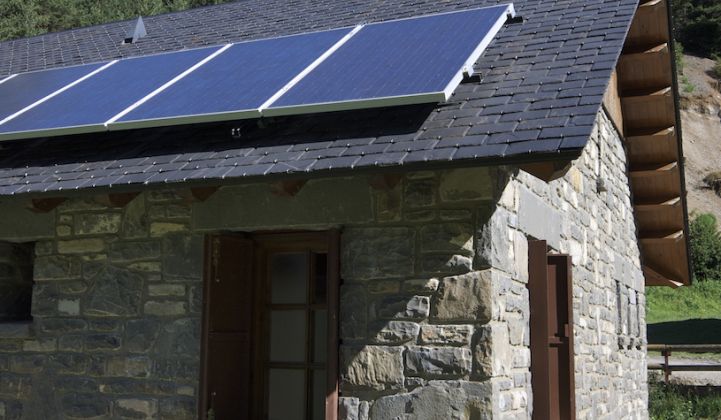Spanish renewable energy interests, consumer groups and opposition parties have slammed a solar self-consumption law passed this month after almost four years of consideration. Unlike a previous draft, the final legislation allows for battery storage, although with conditions that make it impractical.
Specifically, battery owners are not allowed to reduce the maximum power they have under contract with their utility.
Since the largest part of Spanish residential energy bills is related to the contracted power rather than actual electricity use, this makes it harder for battery owners to recoup the cost of their investment.
At the same time, residential customers have to pay a series of charges -- dubbed a "tax on the sun" by detractors -- and have to give away any power they deliver to the grid for free. Energy producers wanting to sell excess power to the grid at spot-price rates must register as a business.
The tax on the sun has a variable component related to the energy produced by the solar installation, and a fixed portion that depends on the contracted power that the government claims is needed to cover the costs of Spain’s electricity system.
In a change to earlier drafts of the royal decree, consumers installing solar panels of up to 10 kilowatts are exempt from the variable part of the charges.
So are all grid-connected self-consumption systems installed in the Balearics and the Canary Islands, where energy generation costs are higher than on the Spanish mainland. The only way for consumers to avoid the tax on the sun altogether, though, is by going completely off grid.
José Manuel Soria, Spain’s Minister for Industry, Energy and Tourism, said the aim of the law was to “boost distributed generation” and “the use of renewable energies.”
A memo to members of Soria’s People’s Party (PP) said: “As generation technologies, especially using renewable sources, are reducing in cost, the royal decree allows their progressive introduction so that self-consumption can increasingly become an essential part of the electricity system.”
The briefing document seen by GTM also claims Spain’s National Commission for Markets and Competition supports the law, even though it has been widely reported in the Spanish press that the regulatory body slammed a draft version of the decree.
The memo furthermore says Spain’s State Council had found the law in line with Spanish and European legislation.
Opposition groups, however, say the law goes against European directives on renewables adoption and energy efficiency, while protecting the interests of utilities with strong influence over the government.
“The way it’s made out, the royal decree safeguards the classic models of energy consumption when what is needed is to help to transform them urgently,” said Cecot, an industry body representing small and medium-sized businesses in Catalonia.
Other regional governments opposed to the law include the Junta de Extremadura in the southwest of the country, where infrastructure and economy minister José Luis Navarro criticized the PP’s “systematic policy of harassment and demolition toward renewable energy in Spain.”
There has also been widespread media condemnation of the law, which was harshly criticized while still in draft form.
“The energy self-consumption law weighs Spain down against the rest of developed countries,” said 20 Minutos.
“Some measures have been softened, but it still imposes charges on consumers,” noted El Confidencial.
More recently, the government and the utilities are attempting to shore up support for the self-consumption law, while also trying to improve their green credentials.
The utility trade body Unesa, for example, is thought to be behind a leaked Boston Consulting Group report warning that Spanish electricity bills could rise by 6 percent upon a 10 percent penetration rate of self-consumption.
And José Bogas, chief executive of the Enel-owned utility Endesa, came out in defense of self-consumption but praised the current regulation in a widely reported speech at Esade, an international business school.
Meanwhile, the government, whose policies in the current legislation have led to the loss of around 65,000 renewable-energy sector jobs, has announced measures to support growth of Spain’s stricken wind industry.
Contention over the self-consumption law is unlikely to die down before the end of the year, since Spain will have a general election on December 20 and all of Spain’s main political parties, except the PP, have pledged to repeal the decree as soon as they are able.
With the political tide turning, the ruling administration likely will not be able to hold its overall majority. Those calling for an end to the law may not have to wait for long.
Daniel Pérez, a lawyer representing the renewable energy industry, is not taking any chances.
“It’s now a matter of challenging it in the Supreme Court and in Brussels, with all the means at our disposal,” he said.
Listen to the Energy Gang discuss the political turmoil for renewables in Spain:



